Most Floridians are unsatisfied with the influence they have on public policy regarding endangered species, according to a recent survey conducted by the UF/IFAS Center for Public Issues Education in Agriculture and Natural Resources (PIE Center).
Survey results indicated that nearly two-thirds of Floridians believe the Endangered Species Act should be strengthened.
“People seem to want to play more of a role in the policy that helps protect endangered species,” said PIE Center director and agricultural education and communication professor Ricky Telg.
 The PIE Center surveyed more than 500 Floridians in August 2016 to explore their perceptions and opinions of endangered species.
The PIE Center surveyed more than 500 Floridians in August 2016 to explore their perceptions and opinions of endangered species.
When given a series of contributing factors to species endangerment, 38 percent of Floridians believed habitat loss is the most important contributor. Other options selected by respondents included invasive species, overexploitation, habitat degradation and pollution.
Additionally, respondents were asked what opportunities they may participate in related to species conservation, and 82 percent of respondents indicated they were likely or very likely to vote to support land conservation programs.
The survey also asked participants about news coverage and learning opportunities related to endangered species. Twenty-five percent of Floridians reported seeing news coverage on endangered species in the past month, while 55 percent had not seen related news coverage. The remainder 20 percent were not sure.
When respondents were asked what opportunities they were most likely to take advantage of to learn more about endangered species, 66 percent preferred visiting a website. Other opportunities favored by Floridians were to read printed materials and watch a video.
Only 16 percent of Floridians said they were most likely to take advantage of attending a workshop to learn more about endangered species.
“Professionals working to help educate audiences about endangered species will benefit from knowing what learning opportunities people will most likely engage with,” Telg said. “Most people just want to go to a website or watch a video.”
Respondents were also asked to rate the importance of conservation for eight native species. Results indicated that Floridians feel it is most important to conserve fish, followed by mammals and plants, but least important to conserve microorganisms, followed by invertebrates and amphibians. Other species that were rated in the middle were birds and reptiles.
Media contact: Ashley McLeod, ashleynmcleod@ufl.edu or 352-273-0793
Ricky Telg, rwtelg@ufl.edu or 352-273-2094


















